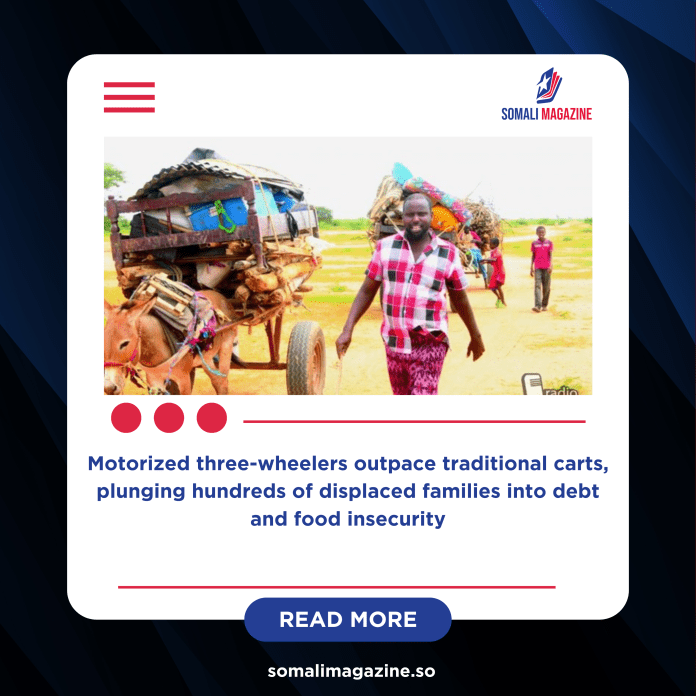Facebook Twitter (X) Instagram Somali Magazine - People's Magazine
In Baidoa’s bustling market, motorized three-wheelers—known as bajajs or tuk-tuks—are now the most popular way of transporting goods. While this change makes life easier for many customers, it has pushed hundreds of traditional donkey cart owners out of work.
Barre Hilowle Mohamed, 64, is among those most affected. He moved to Mubarak camp for displaced people in 2023 after drought destroyed his family’s three-hectare farm in Ooflow, about 90 kilometers away. Since then, he has tried to earn a living by renting a donkey cart. He paid $1 a day to rent it and another $3 to feed the donkey, usually earning a small daily profit of $5.
But business has dried up. Customers now prefer tuk-tuks, which are faster and often cheaper than donkey carts. Barre hasn’t had steady income since May and now relies on help from neighbors in the camp just to eat.
“Our neighbors give us food when they notice we haven’t cooked anything,” Barre said. “If we find a few pieces of bread during the day, that’s what we sleep on.”
He has no other skills to fall back on and is struggling to survive. Water at the camp costs 5,000 Somali shillings per jerrycan—too expensive for many families. Barre already owes $50 in water bills and can’t get more on credit.
“The biggest problem is that we have no work. The market where we used to earn a living has changed, and even the people who used to rent out donkey carts can’t help us anymore,” he said.
Mursal Hassan Ibrahim faces a similar struggle. He once supported his family of nine by transporting goods with a donkey cart, earning $5–7 a day. Now, his customers have switched to tuk-tuks.
“The worry is that if life continues like this, our children won’t go to school. We’ve lost our jobs and can’t provide for them,” Mursal said. “I fear things will only get worse.”
His family now depends on cooked meals given by neighbors in Bula-nurio camp. Mursal owes $90 in cart rental fees and $170 to a local shop for food. Despite walking into Baidoa every morning searching for any kind of work, he hasn’t found anything.
Ali Isaaq Dahir, who represents over 100 displacement camps in Baidoa, said that around 300 families who relied on donkey cart work are now jobless. He said the rise of tuk-tuks has changed the local economy quickly and drastically.
“People used to help each other,” Dahir explained. “If someone made money that day, they would support a family in need. But now, even those who used to help are the ones struggling.”
According to Dahir, things are getting worse as more families arrive daily, fleeing conflict or drought. Resources are stretched, and humanitarian aid has been reduced, making it harder for the community to cope.
The camp committees have reported the situation to the South West State government and humanitarian agencies, hoping for support before the crisis deepens.
For now, people like Barre and Mursal are left in limbo—unable to find work, trapped by debt, and trying their best to feed their families in a market that has moved on without them.

